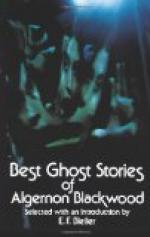She hurried out of the pew and ran towards him. “Oh, Hugh, Hugh, have you come back?”
He looked round with a smile. He had not been killed. It was all a mistake. He was going to speak. . . .
Footsteps sounded hollow in the empty church. She turned and glanced down the dim aisle.
It was an old sexton or verger who approached. “I thought I heard you call,” he said.
“I was speaking to my husband.” But Hugh was nowhere to be seen.
“He was here a moment ago.” She looked about in anguish. “He must have gone to the door.”
“There’s nobody here,” said the old man gently. “Only you and me. Ladies are often taken funny since the war. There was one in here yesterday afternoon said she was married in this church and her husband had promised to meet her here. Perhaps you were married here?”
“No,” said Mrs. Wilton, desolately. “I was married in India.”
* * * * *
It might have been two or three days after that, when she went into a small Italian restaurant in the Bayswater district. She often went out for her meals now: she had developed an exhausting cough, and she found that it somehow became less troublesome when she was in a public place looking at strange faces. In her flat there were all the things that Hugh had used; the trunks and bags still had his name on them with the labels of places where they had been together. They were like stabs. In the restaurant, people came and went, many soldiers too among them, just glancing at her in her corner.
This day, as it chanced, she was rather late and there was nobody there. She was very tired. She nibbled at the food they brought her. She could almost have cried from tiredness and loneliness and the ache in her heart.
Then suddenly he was before her, sitting there opposite at the table. It was as it was in the days of their engagement, when they used sometimes to lunch at restaurants. He was not in uniform. He smiled at her and urged her to eat, just as he used in those days. . . .
I met her that afternoon as she was crossing Kensington Gardens, and she told me about it.
“I have been with Hugh.” She seemed most happy.
“Did he say anything?”
“N-no. Yes. I think he did, but I could not quite hear. My head was so very tired. The next time——”
* * * * *
I did not see her for some time after that. She found, I think, that by going to places where she had once seen him—the old church, the little restaurant—she was more certain to see him again. She never saw him at home. But in the street or the park he would often walk along beside her. Once he saved her from being run over. She said she actually felt his hand grabbing her arm, suddenly, when the car was nearly upon her.
She had given me the address of the clairvoyant; and it is through that strange woman that I know—or seem to know—what followed.




